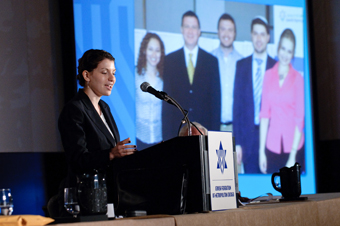Why there is a kernel of Russianness in me that just won’t go away
Permanent link All Posts

This year marks the 20th anniversary of Operation Exodus, a massive effort by the North American Jewish community to rescue and resettle more than 1 million Soviet Jews. Chicago welcomed more than 30,000 Russian-speakers.
You might wonder why a person named Jane Charney—such an American name—would be telling you about all the wonderful opportunities that Federation provides for the next generation of Russian-American Jews in Chicago.
In fact, I wasn’t always Jane Charney. When my family moved to the United States from Moscow nearly 14 years ago, we quickly adjusted our names to more English-friendly ones. Let’s face it, Yevgeniya Leonidovna Charnaya is a bit of a tongue-twister.
Although my family came to America after the major wave of immigration of the early 1990s, we experienced the impact of Operation Exodus firsthand. The community opened its arms to us and made us feel welcome. My sister and I enrolled in Jewish Sunday School. Our synagogue paired us with a Russian-speaking family that had lived in the States since 1989.
Once I got to Indiana University, I actively participated in Hillel, where I chaired the communications group and helped create IU’s first-ever Israel-palooza—a celebration of all things Israel in the middle of campus. From Friday night services to late-night study sessions to Israel advocacy, Hillel inspired a deeper connection to Jewish life in me.
After college, that connection translated into working in the Jewish Federation world. That’s one of the ways I can give back to a community that already has given me so much.
As American as I feel at times, there’s a kernel of Russianness in me that just won’t go away. I’ve turned it into an advantage: Over the past several years, I’ve put together workshops on identity and Russianness. I also led a trip for Russian-speakers to discover Jewish heritage in Spain.
Whether it’s been five or 15 years since immigrating to the States, many of my fellow Russian-speaking Jews also cherish some aspect of our Russianness—the language or the culture or the sheer wealth of jokes that simply do not translate well into English. At the same time, we live in the United States, we speak English with our friends, and our attitudes borrow from both our American education and our Russian-Jewish souls.
My peers want to find more ways to feel Jewish, to live Jewishly and to create Jewish connections. That’s where community institutions like Russian Hillel and the Federation’s Russian Jewish Leadership Forum come in.
I was part of a core group of nine Russian-speaking Jewish young professionals who formed RJLF about a year and a half ago. We recognized the need for a post-college bridge to the Jewish community that had a specifically Russian taste. Since then, together with JUF staff the nine of us have been creating events that bring together 20- and 30-something Russian-speaking Jews from around Chicago.
We’ve sponsored holiday celebrations with the Russian Senior Center at the Dina and Eli Field EZRA Multi Purpose Center, served meals at the Uptown Cafe, and packed food boxes with Maot Chitim at Passover time. A group of RJLF leaders met with former Prison of Zion and current Israeli Minister of Public Affairs and Diaspora Affairs Yuli Edelstein. We’ve hosted receptions at the Standard Club, listened to Russian classical music at Ravinia, and gathered for professional networking events.
This year, in celebration of the 20th anniversary of Operation Exodus, my husband and I created and hosted an Exodus Seder for other RJLF participants. Our peers told their own personal stories of exodus. And another Russian Jewish communal worker, a JVS colleague, who had lived in refusal for 12 years, shared his story with the group.
In addition, as a group we have participated in larger community events, like Israel Solidarity Day, campaign phonathons and the Young Leadership Division’s Big Event.
Much like native-born Americans, RJLF participants represent all levels of religious observance and political affiliation. Some are single, some are married, and some have children.
Some participants are graduates of the Hillels Around Chicago’s Russian Hillel program, which was established seven years ago from a Federation-supported priority grant. Russian Hillel aims to connect Russian-speaking Jewish students to their Jewish identity, to the community and to each other.
RJLF was created in part as an outgrowth of this initiative and at the urging of some Russian Hillel graduates who were interested in remaining involved in the organized Jewish community after college. In fact, some of our participants and leaders come from Russian Hillel. But many others came to us through friends or Facebook. Still others found us out of a desire for a Russian Jewish community after they relocated to Chicago.
The response to RJLF has been significant. So much so that we recently decided to expand the leadership opportunities for our activists and develop an RJLF Leadership Council. It will give more participants the chance to take ownership of the group as we connect to our Jewish identity and our Jewish community in Chicago.
On Sept. 15, Jewish Agency for Israel Chairman Natan Sharansky spoke to a crowd of 1,200 at the Federation’s Annual Meeting. He focused on the power of Jewish identity and the notion of peoplehood, a sense of Jewish connectedness. That’s the message we take with us as we move forward and develop our activities for the next generation of Russian-speaking Jews in Chicago.
A muscovite by birth, Jane Charney immigrated to the United States in 1996.



.jpg)



